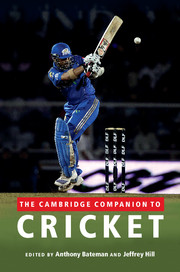Book contents
- Frontmatter
- Introduction
- 1 Cricket pastoral and Englishness
- 2 Cricket in the eighteenth century
- 3 Corruption in cricket
- 4 Broadcasting and cricket in England
- 5 Bodyline, Jardine and masculinity
- 6 Don Bradman: just a boy from Bowral
- 7 The Packer cricket war
- 8 New Zealand cricket and the colonial relationship
- 9 C. L. R. James and cricket
- 10 Reading Brian Lara and the traditions of Caribbean cricket poetry
- 11 The detachment of West Indies cricket from the nationalist scaffold
- 12 The Indian Premier League and world cricket
- 13 Hero, celebrity and icon: Sachin Tendulkar and Indian public culture
- 14 Conflicting loyalties: nationalism and religion in India–Pakistan cricket relations
- 15 Cricket and representations of beauty: Newlands Cricket Ground and the roots of apartheid in South African cricket
- 16 Writing the modern game
- 17 Cricket and international politics
- Further reading
- Index
13 - Hero, celebrity and icon: Sachin Tendulkar and Indian public culture
Published online by Cambridge University Press: 28 September 2012
- Frontmatter
- Introduction
- 1 Cricket pastoral and Englishness
- 2 Cricket in the eighteenth century
- 3 Corruption in cricket
- 4 Broadcasting and cricket in England
- 5 Bodyline, Jardine and masculinity
- 6 Don Bradman: just a boy from Bowral
- 7 The Packer cricket war
- 8 New Zealand cricket and the colonial relationship
- 9 C. L. R. James and cricket
- 10 Reading Brian Lara and the traditions of Caribbean cricket poetry
- 11 The detachment of West Indies cricket from the nationalist scaffold
- 12 The Indian Premier League and world cricket
- 13 Hero, celebrity and icon: Sachin Tendulkar and Indian public culture
- 14 Conflicting loyalties: nationalism and religion in India–Pakistan cricket relations
- 15 Cricket and representations of beauty: Newlands Cricket Ground and the roots of apartheid in South African cricket
- 16 Writing the modern game
- 17 Cricket and international politics
- Further reading
- Index
Summary
When he completed twenty years in international cricket in November 2009, Sachin Tendulkar reaffirmed his status as one of the greatest public icons of post-independence India. Ever since his genius was first glimpsed on the maidans of Bombay over two decades ago, Tendulkar has reigned supreme as a sporting idol, his popularity cutting across the boundaries of caste, class, gender, region and religion. Curiously, however, there has been relatively little scholarly scrutiny of the Tendulkar phenomenon and what it might tell us about the changing nature of Indian public culture.
This chapter attempts to understand, and account for, Sachin Tendulkar's enduring hold over the Indian public imagination by exploring three facets of his remarkable career. The first section considers, in historical context, Tendulkar as ‘hero’: someone who displays superlative skills and performs spectacular feats. An analysis of popular sporting figures needs to reckon with the ways in which their attributes and accomplishments on the field of play are crucial to their elevation as heroes. However, the analytical prism of the ‘hero’ is insufficient in itself in accounting for Tendulkar's fame. The second section suggests that Tendulkar's celebrity is an attendant effect of the intensified relationship between cricket, television and money in contemporary India. At the same time, the immense power and resonance of Tendulkar's image within Indian society makes him more than a frothy confection of the sport–media nexus. The final section argues that as a national icon Tendulkar embodies the aspirations of millions of Indians. The symbolic meanings they have invested in his persona derive their charge from the interplay between cricket, nationalism and the middle classes in contemporary India.
- Type
- Chapter
- Information
- The Cambridge Companion to Cricket , pp. 187 - 202Publisher: Cambridge University PressPrint publication year: 2011
- 2
- Cited by



